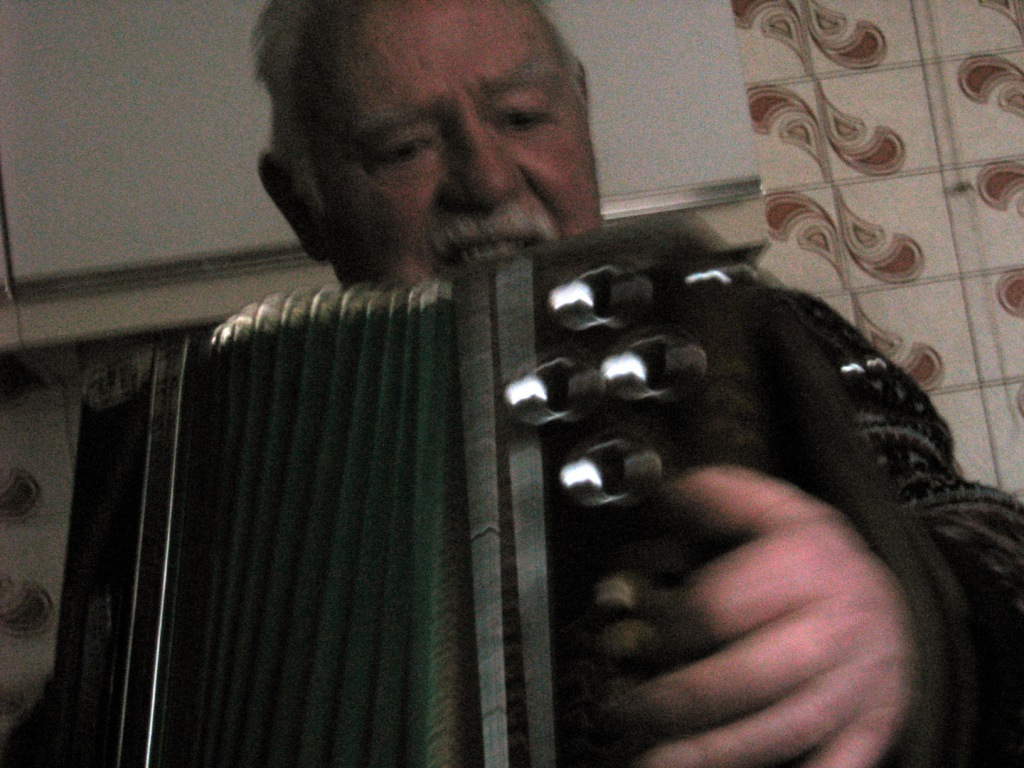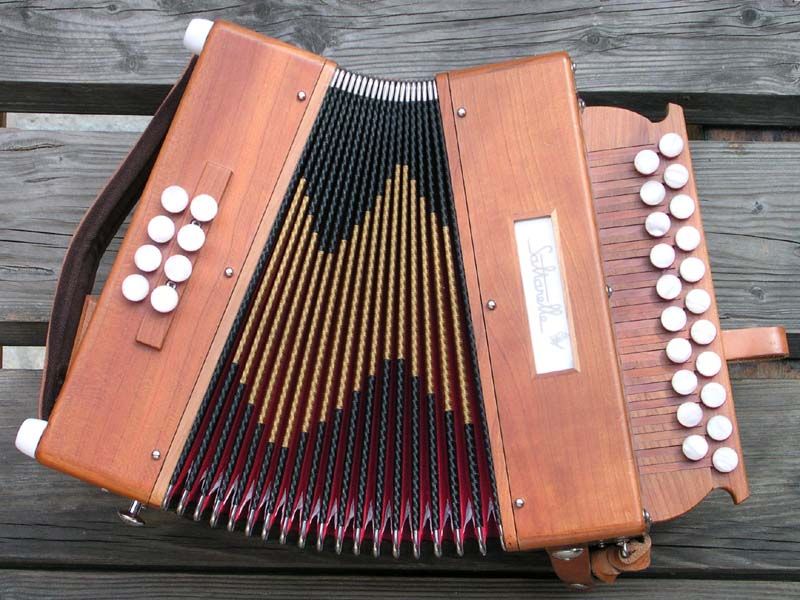The traditional sound of Friuli
"Those who do not like music and women, they need to have their house burned down!!"
I’ve heard about him since long time, and when I mentioned his name to some friulian musician their reaction was moving the head up criyng “ahhhh! Lisooo, "as if they knew him since long time”. In fact Andrea del Favero (see post "Music of Friuli") repeatedly told me "he is the master of all of us." Liso Lussa is 85 years old but he has the verve of a twenty years old guy. He is one of the major representative of today’s traditional Friulian music.  He plays the organetto, here they call it "diatonic harmonic" (see picture) one of the most typical instruments of the area along with Liron and guitar. Together with Andrea, Dario Marušiæ,an Istrian violinist and Angelico Piva (see "Music of Friuli") I go to visit him. We cross the Tagliamento river and reach the left side leaving behind Cividale del Friuli and entering the land strip known as Slavia. This is a place of historical and political episodes that, over the time, have built interesting cultural and musical syncretisms. In this area they speak Friulian language as well as a Slovenian dialect. He plays the organetto, here they call it "diatonic harmonic" (see picture) one of the most typical instruments of the area along with Liron and guitar. Together with Andrea, Dario Marušiæ,an Istrian violinist and Angelico Piva (see "Music of Friuli") I go to visit him. We cross the Tagliamento river and reach the left side leaving behind Cividale del Friuli and entering the land strip known as Slavia. This is a place of historical and political episodes that, over the time, have built interesting cultural and musical syncretisms. In this area they speak Friulian language as well as a Slovenian dialect.
We arrive at his house and his wife welcomes us. I can perceive the typical smell of mountain old houses. Liso is waiting for us near the warm kitchen fireplace. He knows that there is a person from Veneto region who wants to record him and then he tries to speak Italian. I would have preferred that he did not. His piano organ is next to him out of its custody waiting to be "worn". It is personalized with his name. After a few moments Liso is already playing and between a song and another he tells some jokes or anecdotes of his youth speaking half Italian and half Friulian. Everybody knows his main saying: “Those who do not like music and women, they need to have their house burned down”.
When Liso plays, everibody demonstrate devotion and respect. While Andrea is listening he assumes the same expression as when he is playing. He tells me that "rather than playing Liso makes a Swing." All of them are betting that “they would be able to recognize Liso’s way to play  among dozens of piano organs." Angelico hums a song over his notes and occasionally even Liso sings with him. They have played together for a long time "One day by chance I heard him to play and I proposed him to form a group, he agreed immediately saying he knew a friend who was playing bass (Roberto Tonutti)” Straight after they made a recording in a restaurant near his house, where they served only pasta. This is how the musical work of the "Bintars" started. Liso is considered the link between Slovenia and Italy. Together with Angelico went to Slovenia to bring spare parts to harmonics manufacturers in order to accelerate the delivery times with the risk of having many problems with customs. He was the first to colour the bellows of the harmonic. "Before it was just gray, I did not like, so I painted it with the colours of the Italian flag and I created a fashion." When we were about to leave he confessed me that he would like to play every day, but his hands are not the ones they used to be. among dozens of piano organs." Angelico hums a song over his notes and occasionally even Liso sings with him. They have played together for a long time "One day by chance I heard him to play and I proposed him to form a group, he agreed immediately saying he knew a friend who was playing bass (Roberto Tonutti)” Straight after they made a recording in a restaurant near his house, where they served only pasta. This is how the musical work of the "Bintars" started. Liso is considered the link between Slovenia and Italy. Together with Angelico went to Slovenia to bring spare parts to harmonics manufacturers in order to accelerate the delivery times with the risk of having many problems with customs. He was the first to colour the bellows of the harmonic. "Before it was just gray, I did not like, so I painted it with the colours of the Italian flag and I created a fashion." When we were about to leave he confessed me that he would like to play every day, but his hands are not the ones they used to be.
It was beautiful and important to have this opportunity, I think people like Liso are rare “safes” of traditional music from which to draw valuable information and old emotions.
Thanks to: Andrea del Favero, Angelico Piva and his wife, Dario Marusic, Liso Lussa and his wife, all the musicians present at the tavern “La torre antica” of Spilimbergo.
Here after one of Liso Lussa’s favorite piece. The title is "Valzer di Napoleon", “Resiano” traditional song and dancing. They say this song was sung by Napoleon Bonaparte troops.
|